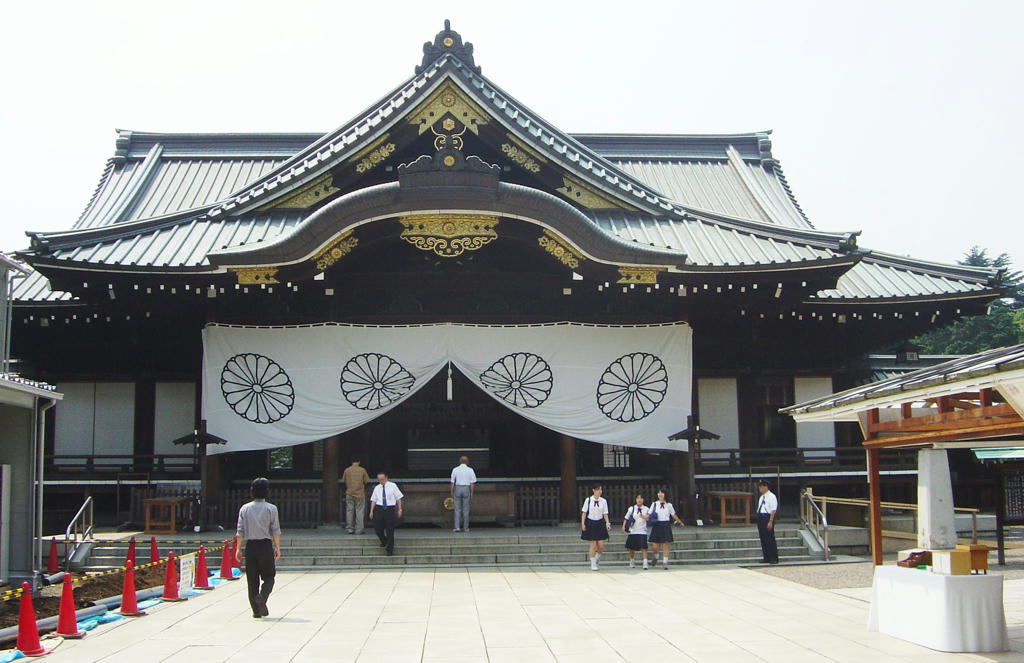Yasukuni is not a typical shrine. Well, in terms of architecture - it's like every shinto shrine of the mixed, later type, nothing outstanding. But Yasukuni is now a symbol of Japanese neverending nationalism.
I'm having a ball these days, seriously. So much is happening I stopped reading comments just to focus on main story (or stories). We all know about the feud between Japan and Korea regarding tiny islands of Dokdo (yes, I'm using Korean name). In 1910, when Japan annexed Korea, those island, as part of Korean teritory were included into the Japanese Empire. All ended on August 15, 1945 (yes, today, it's not a coincidence, wait for the later part) when Japan surrendered and all land returned to Koreans. Somehow Japan started to think that Dokdo should belong to them. Don't ask me why. Following this logic, maybe Seoul and few other cities (ah, hell, half of peninsula!) should belong to Japan too? No, let's not stop here, give Shandong, Shanghai, Philippines, Burma to Japan too. Just because.
Japan claims the scraps of land as theirs just because for 35 years it belonged to the Empire. So, Poland should royally fuck all countries from Lithuania to the Black Sea claiming the land as theirs, just because hundreds years ago those lands belonged to their Kingdom. O--key. Maybe 3 countries should claim also Poland because for around 200 years they divided it? I dunno, tough history.
So yeah, I find Japan's claim ridiculous. Also, the country's having non-ended feud with Russia over Kuril Islands, with China over some islands (in potentially gas/oil rich sphere, ekhem). What Dokdo means to Japan? Except for the means of "punishing the ill-behaving daughter"* that is Korea, practically nothing. Oh maybe for a strategical point, closer to mainland, closer to North Korea, you know, them boys' warfare stuff.
So yeah, I find Japan's claim ridiculous. Also, the country's having non-ended feud with Russia over Kuril Islands, with China over some islands (in potentially gas/oil rich sphere, ekhem). What Dokdo means to Japan? Except for the means of "punishing the ill-behaving daughter"* that is Korea, practically nothing. Oh maybe for a strategical point, closer to mainland, closer to North Korea, you know, them boys' warfare stuff.
Football player Park Jong-woo was holding a sign reading (in Korean) "Dokdo is our territory" and IOC chief said the player should be banned. OK, while I find Korean excuses silly ("it wasn't in English, so it doesn't violate any rules of stating political views"), I don't think this should end up with banning the player. Stupid move, but we know Koreans act rashly.
This is why Korean nationalism doesn't interest me. They are quick, noisy, eager to self-incineration if the cause is right, ready to build the barricades (hmm... I feel like describing my people too) and grab a sword, this nationalism is too blatant to be interesting.
They say, dog that barks doesn't bite. It's the silent dog that's really dangerous.
Japan nationalism is much more fascinating. It's an amazing amalgam of so many ideas, roots, beliefs and - let's face it - geography too. Japanese, due to their island lands, share the same haughtiness with British people, so that they can keep proudly away from the continental mess. It's something really ironic both countries were empires.
Japanese prefer silent manifestations of their nationalism, sometimes so craftily woven into public, it eludes many eyes and passes almost unnoticed. Like Rising Sun on their athletes during London Olympics. While it's not something that catches attention, only those who are familiar with "hinomaru" sign will see it. But it's there nonetheless. And "hinomaru" is not just a flag. It's a nazi flag.
August 15th marks Japan's surrender. The day before, in 1945, then Emperor Hirohito recorded a message to all his subjects about Japan's defeat. Some officers broke into the palace and tried to destroy the record and to force Japan to fight to the end. August 15th is the Independence Day in Korea.
On August 15th, that is today, National Public Safety Commission Chairman Jin Matsubara and Transport Minister Yuichiro Hata visited the Yasukuni shrine. Coincidence? Maybe. Maybe weather was good and traffic light. And maybe if grandma had a mustache she would be grandpa.
The problem with Yasukuni lies in a typical Japanese custom of paying respects to the dead. Especially those who died fighting for motherland. Yasukuni was built during Meiji era (named Yasukuni in 1879) for the sole purpose of pacifying those who gave lives for Japan. Up to this moment everything seems fine, it's a normal thing to have a shrine like that. Many countries have graveyards, monuments, places devoted only to soldiers.
But Yasukuni is slightly different. Through Yasukuni Japan is venerating its past the spirits of those who died during WWII as well. Still no bells? Yasukuni enshrines tablets to 14 war criminals judged and executed by Tokyo Tribunal.
And this is what pisses off all neighbouring countries. Not those hundreds of souls of grunts who died, but those from high military, those who led Japan to destructive end, those who have drowned in blood. And they are treated like war heroes.
Japan has perfect explanation for this saying it's the common belief that the spirit may come back to seek the vengeance on livings unless it is offered some rites. There were few vengeful spirits who haunted imperial family in Japan history, yes yes, but all of them suffered injustice during lifetime (or so they thought), so all of them had a good reason to come back. Venerating general Tojo there is a tiny, tiny bit unpleasant for many people.
This is why visiting Yasukuni always makes waves in Asia.
And this is why Japanese nationalism in its terror has unmatched beauty in this world.
China and Korea always start the noise whenever any Japanese politician visits Yasukuni, and japanese media highlight this event.
* during his campaign in Korea (1592-98), this was the expression Toyotomi Hideyoshi was using.

